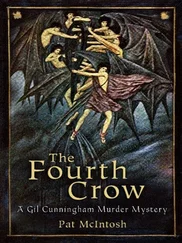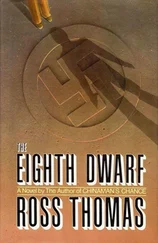“Want me to see about a room for you when I see about mine?”
“Why, yes. Thank you.”
“Any preference?”
“An ocean view would be nice.”
“What if they have only one ocean-view room left?”
“Then we’ll just have to share it, won’t we?” she said.
After Vines returned from the registration desk, he lied without shame and told her there was only one ocean-view room available. She smiled, as though welcoming the lie, gathered up her purse, rose and crossed to the bar, where she reached into the purse, brought out a fifty-dollar bill, said something to the gray-eyed bartender and handed him the money. The bartender smiled happily, pocketed the bill and handed her a bottle of Scotch whisky. Holding the bottle by its neck down at her left side, she walked back to Vines and said, “No need to go thirsty, is there?”
They ate room-service hamburgers and drank a third of the bottle with their clothes on. They drank another third with their clothes off. Vines discovered that Dixie was indeed blond all over and she apparently discovered all she wanted or needed to know about him-not because the liquor made him talkative, but because he replied frankly and more or less honestly to whatever she asked, assuming the questions were a necessary part of her task, assignment-perhaps even her calling.
The questions were casual, sometimes mere afterthoughts, and she often seemed not to listen to his answers, especially after their clothes were off and she was sitting on his lap, nibbling at his right ear. The only time she listened intently was when she asked Vines about the black cane and whether he had served in Vietnam.
“No,” he said. “Why?”
“That cane.”
“It’s not mine.”
“Well, it can’t be a present. You don’t gift wrap a cane and give it to somebody.”
“It belongs to the guy in Lompoc I told you about.”
“Is he lame?”
“No.”
“Then what’s he need a cane for?”
“He hides his booze in it.”
Dixie rose from Vines’s lap, went to the bed and picked up the cane. She gave it a hard shake, laughed at its telltale gurgle, twirled it like a baton-passing it expertly behind her naked back-pranced over to the lamp with the chartreuse ceramic base, where, with exaggerated care, she hooked the cane over the lampshade, turned to Vines with a grin and said, “Let’s try the bed.”
Seconds later they were not quite under the bedcovers, legs intertwined, hands busy, tongues exploring new territory. Later, during recess, Vines said, “If you were me, what would you do tomorrow-first thing?”
“For your hangover? I’d try the bar downstairs and a bloody mary around-well, say, eleven.” She paused. “And I’d bring the cane along.”
“Around eleven and bring the cane,” Vines said. “What time is it now?”
“Who cares?”
By the time Vines had finished his tale about the blond Dixie and his meeting the following morning with Durango’s chief of police, Sid Fork, they had reached Ocean Avenue in Lompoc. The annual Flower Festival parade seemed to have ended but the avenue was still jammed with locals, tourists, uniformed high school band members, good natured police, cars and a large number of florist delivery vans from out of town.
One of them, a pink Ford van with a scripted green sign on its rear door that read, “Floradora Flowers, Santa Barbara,” darted around the Mercedes on the left, horn bleating. The pink van almost clipped the sedan’s front left fender as it veered back into the lane and slammed on its brakes for a red light. Vines sounded his own horn in a disapproving honk.
As if on signal, the rear door of the van flew open and something black and round and shiny pointed itself at the Mercedes. Vines instinctively began to duck, but when he saw that the black, round, shiny thing was a 35mm camera with a moderately long lens, he instead covered his face with both hands, peering between his fingers at the photographer.
Jack Adair had jumped with a noticeable start when the pink van’s rear door banged open. But he didn’t bother to hide his face. Instead, he tilted his head back to eliminate any trace of the vanished triple chin, smiled a beaming, practiced smile, quickly erased it and stuck out his tongue.
The photographer was a dark-haired woman who, from her quick sure movements, Vines guessed to be in her late twenties. She wore pale blue coveralls and enormous dark glasses with white plastic frames. Her camera was obviously motor-driven and Vines estimated she had had time to expose at least six frames, maybe even seven.
After Adair stuck out his tongue, the woman lowered her camera and grinned at him. She slammed the rear door shut as the van made a fast right turn on red, causing a few pedestrians to jump back. The pink van sped off down the side street. Vines made no attempt to follow. When the car behind him honked, he noticed the light had changed to green, took his foot off the brake and drove straight ahead.
Neither Vines nor Adair said anything for half a block. It was then that Adair cleared his throat and said, “I don’t suppose she was from People magazine?”
“No.”
“Somebody needed proof of what-us being back in harness?”
“I think they were just dropping a hint.”
“What kind?”
“That they know where we’re going.”
“Well, that’s part of the plan, isn’t it?”
“That’s part of the plan,” Vines agreed. “Such as it is.”
They drove in silence for nearly five minutes until they reached Lompoc’s eastern edge and turned right onto a state highway with a poppy-decorated road sign that designated it as the scenic route to U.S. 101. Adair looked at Vines and said, “This the shortest way?”
“The prettiest anyhow.”
Adair smiled contentedly, said, “Much obliged,” and for almost ten minutes silently admired the rolling green and tan foothills that boasted scattered stands of fine old oaks and, here and there, some dairy cows, all of them black-and-white Holsteins. Deciding that cows still looked as bored silly as ever, Adair said, “We meet this guy Fork and the mayor for dinner, right?”
“At her place.”
“How’d you size him up-the chief?”
“Ever met a slightly bent Zen-Rotarian?”
“Don’t think so.”
“You will tonight.”
“You haven’t met her honor, B. D. Huckins, yet?”
“Not yet.”
“What’s the B. D. stand for?”
“Barbara Diane.”
“She the brains, you think?”
Vines sighed. “Let’s hope so.”
To reach Mayor B. D. Huckins’s two-bedroom frame bungalow on the cul-de-saccalled Don Emilio Drive, it was necessary to travel up Garner Road into the sand, shale and clay foothills of the faintly forbidding mountains that helped isolate Durango from the commercial rewards of tourism and the cultural benefits of free television.
Named after an almost forgotten U.S. Vice President by a totally forgotten developer, Garner Road consisted mainly of seven hairpin turns. Mayor Huckins lived just off the seventh hairpin and Sid Fork, the chief of police, lived two hairpins down on Don Domingo Drive, another cul-de-sac, in a two-bedroom house whose floor plan was identical to the mayor’s.
The mayor’s house was painted sky-blue with dark blue trim that complemented a fine stand of jacaranda. The chief’s house, which should have been repainted, was described as “measle white” by the mayor because its flaking paint exposed a rash of strange pink spots that she said looked contagious.
Fork had landscaped his house with rocks and cactus. The rocks were six extremely large and ugly igneous boulders, weighing anywhere from a quarter to a half ton, that had been dumped on the chief’s property by a disgruntled and illegal Mexican alien.
Читать дальше












